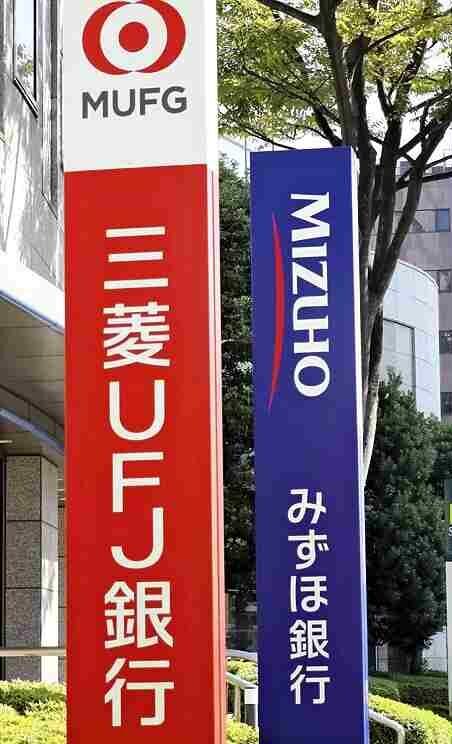
Signs for two major banks are seen in Tokyo in May.
12:38 JST, September 2, 2021
The Financial Action Task Force (FATF) has urged Japan to swiftly enhance its measures to combat money laundering, an area in which mid- and small-sized financial institutions, such as local banks and Shinkin banks, are particularly lagging.
This is expected to have repercussions for depositors and borrowers, and financial institutions will have to balance such measures with ensuring convenience for their customers.
In the FATF report released on Monday, Japan was placed in the “enhanced follow-up” category, the second of a three-stage ranking.
This is the same level as the United States, Australia, Singapore and other countries. There is not expected to be any impact on Japanese financial institutions’ transactions for the time being.
Finance Minister Taro Aso issued a statement on the day, saying: “Crimes like money laundering have become more sophisticated and global. We need to review our measures continually, based on the trends at home and abroad.”
Over the past few years, Japan has been putting effort into measures against money laundering in both the public and private sectors, aiming to catch up with major countries. In mid-August, the National Police Agency, the Finance Ministry and other relevant government agencies set up a council tasked with addressing the issue, and compiled an action plan that includes a road map for the next three years.
Starting this autumn, the Financial Services Agency will closely investigate whether financial institutions under its jurisdiction are taking adequate measures. Specifically, the FSA will conduct detailed investigations into local banks and Shinkin banks, as well as funds transfer providers offering smartphone payments and other services, and cryptocurrency exchange providers.
The agency will encourage these businesses to confirm the identity of customers when opening an account and transferring money, and to create systems to detect illegal funds transfers.
Financial institutions are also actively cooperating with the agency. The Japanese Bankers Association on Monday issued a statement saying, “We will work to enhance the risk management system of the entire banking industry.”
This is prompted by concerns that Japanese banks might be subject to business restrictions if they are perceived as being unenthusiastic about combating money laundering, according to a senior official at a major bank.
However, the FATF said some financial institutions such as local banks, Shinkin banks, funds transfer providers and cryptocurrency exchange providers have failed to take appropriate measures. Compared to major banks, some of these organizations do not have sufficient customer management systems or a clear grasp of their transactions and actual users, which the FATF saw as problematic.
Bewildered bankers
Improving measures against money laundering is difficult for local banks, Shinkin banks and start-ups offering fintech services, which lack the necessary personnel and expertise.
“We don’t know what we should do specifically,” an official at a local bank based in the Kanto region said in bewilderment. There are moves to pass the cost on to users, through such means as charging fees for dormant accounts.
Funds transfer providers and cryptocurrency exchange providers are trying to improve their anti-money laundering measures by introducing multi-factor authentication, in which multiple elements are used to identify customers, such as passwords and telephone numbers.
However, depositors and clients view these measures as a burden, and even a single flaw in the relevant documents might cause transactions to fail. Since start-ups have attracted customers by offering user-friendly services, the introduction of such measures may undermine their financial base.
According to the NPA, it received about 430,000 reports of suspected money laundering and other crimes in 2020, up about 50% from the level 10 years before. There continue to be many cases in which bank accounts are created illegally with stolen personal information and misused for bank transfer scams and other types of fraud.
The government is actively promoting fintech, which integrates finance with information technology. It must skillfully balance regulations and convenience.
Top Articles in Business
-

Prudential Life Insurance Plans to Fully Compensate for Damages Caused by Fraudulent Actions Without Waiting for Third-Party Committee Review
-

Narita Airport, Startup in Japan Demonstrate Machine to Compress Clothes for Tourists to Prevent People from Abandoning Suitcases
-

Japan, U.S. Name 3 Inaugural Investment Projects; Reached Agreement After Considerable Difficulty
-

JR Tokai, Shizuoka Pref. Agree on Water Resources for Maglev Train Construction
-

Toyota Motor Group Firm to Sell Clean Energy Greenhouses for Strawberries
JN ACCESS RANKING
-

Japan PM Takaichi’s Cabinet Resigns en Masse
-

Japan Institute to Use Domestic Commercial Optical Lattice Clock to Set Japan Standard Time
-

Israeli Ambassador to Japan Speaks about Japan’s Role in the Reconstruction of Gaza
-

Man Infected with Measles Reportedly Dined at Restaurant in Tokyo Station
-

Videos Plagiarized, Reposted with False Subtitles Claiming ‘Ryukyu Belongs to China’; Anti-China False Information Also Posted in Japan





















